OP Sequence
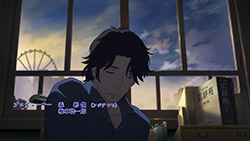 |
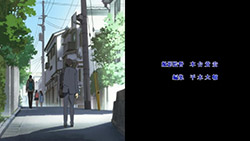 |
 |
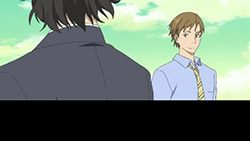 |
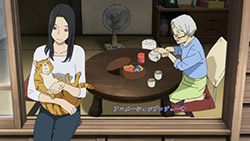 |
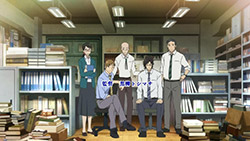 |
OP: 「潮風」 (Shiokaz) by Taiiku Okazaki
 |
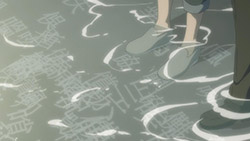 |
 |
 |
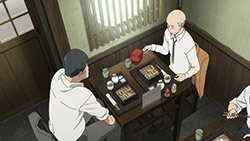 |
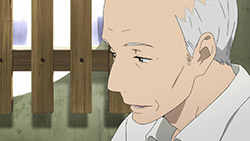 |
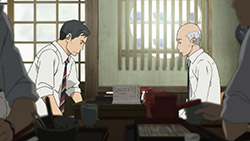 |
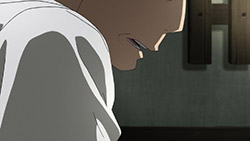 |
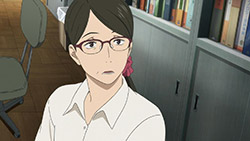 |
 |
 |
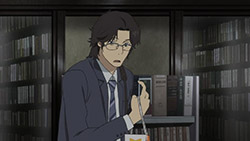 |
 |
 |
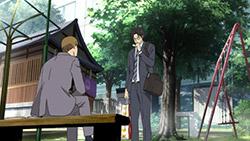 |
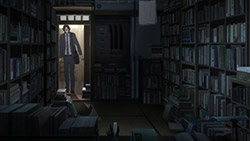 |
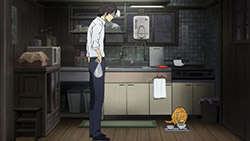 |
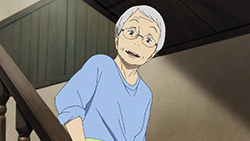 |
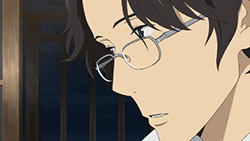 |
 |
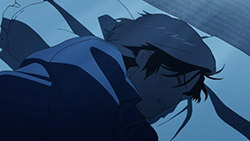 |
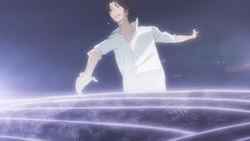 |
 |
 |
 |
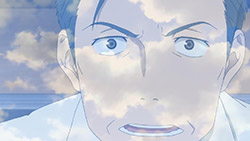 |
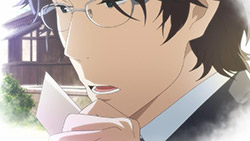 |
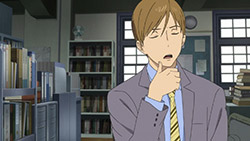 |
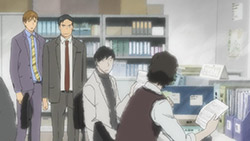 |
 |
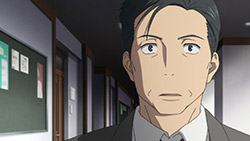 |
 |
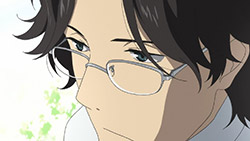 |
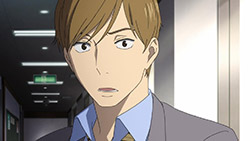 |
 |
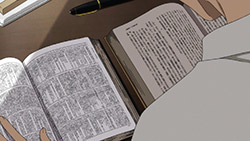 |
「茫洋」 (Bouyou)
Vastness””
Written as: Extensive Ocean — like the dream-conjured sea waves of a hundred thousand words suffocating an unsuccessful salesman’s comprehension of language.
I think it makes sense to write these potentially pretentious openers about how these episode titles are written, given this is a series all about definition and understanding the meaning behind words. I expect these titles to give insight into the episodes beyond the obvious, with this example being how “Vastness” is written – in the way Hajime dreams of the words coming like ocean waves. I’m no expert on Kanji, so if anyone else can chime in on these definition, that would be sweet. It only makes sense to put effort into discussing the details of Fune wo Amu when it’s clearly so passionate about its own subject matter.
I’m ever so grateful that shows like Fune wo Amu continue to exist despite the shifts in trends in anime. 2016 has been an upstanding year for anime, with less tired magic school light novel anime than usual, but with the “trapped in a fantasy world” replacing it – which, for my money, is a better trade off and has actually delivered some recommendable titles this year. Yet Fune wo Amu is a different creation altogether; an anime I’m surprised is being made but am ever so happy it is. It’s based on an acclaimed 2011 novel that has previously been adapted into a live-action movie that also won several prestige awards in Japan and was submitted as an offering for Best Foreign Language film at the Oscars. This suggests that the source material comes from a place of quality, and this anime version backs up that theory. This is an adult drama, a true Noitamina title that we haven’t seen since 2009/2010. I don’t know how something so modern can feel so nostalgic, but that’s where we are with this first episode.
Anyone reading the synopsis of this show must be thinking: “How can an anime about making a dictionary be any good?”. It’s an expected reaction, and I’ve read some criticism that this episode was too slow or boring for some, but chances are if this doesn’t tickle your fancy or have you curious, then you were never the target audience in the first place. With such an obscure and seemingly everyday premise, this isn’t going to attract a large audience, which is a shame in itself, but also an expectation with anime of this ilk. What shines through is that this is a story about understanding the hidden meanings, interpretations, and definitions of words, and that comes across in the passion these characters feel, especially with our lead.
Majime Mitsuya (Sakurai Takahiro) is a funny one – a not very good salesmen who has a borderline obsession with words, to the point where he even dreams about Kanji characters in his nightmares. He may be a word otaku (if that’s really a thing), but he’s instantly likeable in how genuine his mannerisms come across; he’s unassuming and gentle but clearly has a lot on his mind that he doesn’t have the opportunity to express. We get a valuable slice of his life in the way his room is cluttered with books, the way he interacts with his cat, and eats dinner with the lonely old woman upstairs. Those little moments are charming and help establish how he’s just living each day as it comes without any true purpose.
But that purpose comes at him without warning, after his encounter with Nishioka Masashi (Kamiya Hiroshi) where he points out how bad he is at his job. The talking-to he gets from him unearths his passion for defining words, which just so happens to help with the search for a new replacement at the dictionary department, after the senior editor has to retire. What follows is a sense of whimsy and purpose when Majime shows off his natural instincts with words and trying to define them as clearly as possible. When you think about it, trying to define “left” is a tricky thing to do, but Majime does it without thinking twice.
If I had one negative with this premiere it would be that it was a tad over-dramatic and a little on the nose at the key moments. It fit together like a puzzle a little too easily, but it’s a unique enough premise so I’m willing to give it a pass. However, all that is minuscule compare to the joy this premiere gave me. I appreciate when a Noitamina anime feels like it belongs, and this is exactly what we needed to finish off an already strong offering of new anime. I can’t wait to see where this seemingly mundane story goes, especially since it’s already got me interested in the inner workings of forming a Japanese dictionary. Perhaps it’s a difficult thing for English speakers to wrap their head around at first, but there’s an element of poetry and interpretation to the Japanese language that I’m keen to learn more about in the coming weeks, and hope there are others who feel the same way.
ED Sequence
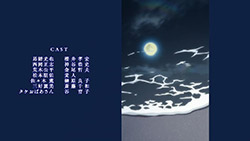 |
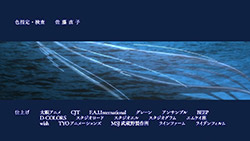 |
 |
ED: 「I & I」 by Leola

i’m a literature nut so i was actually mega-excited about this. i knew it would be good and it didn’t disappoint. can’t really fault this premiere, for me it was perfect!
I’m definitely excited to watch this series. Even more now that i read this “First impressions” of yours.
But to be fair i’m always happy to see new Slice of Life that explore more/new topics instead of our usual School setting that we see the most. Even though that recently i have been seeing a lot SOL of “father (or figure like father) raising a child”, even though that i like it, recently it has been just a little too much :/
Fune wo Amu definitely proves something different from the norm. Glad you enjoyed my first impressions!
Each episode title looks like it will reflect how Hajime acts towards words. That’s just fascinating. I’m already into this.
Seems that way. Interested to see how it will relate to the themes/subject of each episode.
I am almost speechless right now, as after the premise, I didn’t expect it to be this, well, excellent I guess? The Noitamina block was recently truly unpredictable, delivering some masterpieces (Boku Dake ga Inai Machi, Shigatsu wa Kimi no Uso), quite enjoyable series (Subete, Saekano, ZnT) as well as the less enjoyable ones (Kabaneri, Punch Line). Looking at the first episode of Fune wo Amu, it stands somewhere between the first and second group for me, the question is where will it be at the end.
It definitely stands out from the crowd and it’s the main positive for me. We have a slice of life, but as Pmf96 mentions above, not again in usual school setting. We have adult characters, something I really enjoy, a lot. And the animation and soundtrack showed some quality too. After really solid premiere, Fune wo Amu definitely deserves to get some attention, looking forward to it.
(As always, great post Samu, now I can understand why you couldn’t promise blogging Haikyuu on a weekly basis, but still hoping you’ll be able to find some time for it!)
Agreed, it was pretty excellent. Now you can see why I’m pretty stacked already this season… it’s hard to drop shows that I would otherwise love to blog. But I think Fune wo Amu could be something special, so someone has to blog it.
Seems like you picked up almost every show I’m watching this season so far thank you for blogging this Samu. I really enjoy this genre (and after watching Shouwa Genroku Rakugo Shinjuu I really became obsessed) but sadly anime like these don’t get appreciated enough. I’m not a native english speaker let alone my knowledge of japanese – for the next episodes I probably have to use an online-dictionary to look up some words (using a dictionary for an anime about dictionaries if that isn’t funny…) It might also be almost impossible to translate every definitions properly because of the different meanings in the two languages however I really enjoyed this episode I’m really looking forward to seeing more.
What can I say, I like to think I have pretty good taste and pick the best shows each season 😉
Quick pitch on the definition of 「茫洋」 or “Vastness” here. The subs I checked covered the general gist of the given definition though I would add that a nuance of the second half of the definition is not just immense. As a literal translation, it can translate as “immense to an extent beyond limits that one can fathom.” As mentioned in the definition example, it can commonly be used to describe an ocean and it can also be used to describe a person as well. Also will add that the term used for “ocean” in the example itself implies a vast ocean and is also sometimes used to describe a vast expanding water surface for ponds/lakes as well.
Interesting stuff! Feel free to chime in each week with these episode titles, since I’m sure they’re room for interpretation with them.
Slow and boring??? Anyone who says that has something wrong in their head…I barely even felt 20 minutes passed! Heh, just kidding, “to each his/her own” as they say. Maybe I’m the one with something wrong in my head as I teared up a bit in the scene when Araki met Majime, how both of them are so observant and particular with words. I’m no linguist, but I tend to be the same to the point that I think my friends are “amused” with me. I was bummed that I missed the local screening of the movie version, but this anime is here now to sate my needs.
I hope the quality will be maintained or even improved as the season progresses. The choice to mosaic scenes in one part of the episode (when Araki was looking around for a replacement) was jarring at first, but it makes sense given the situation. It’s a bit unconventional, but I think that the team behind this anime is willing to make those kinds of styles given the “unconventional” premise of this anime.
Show Spoiler ▼
Thanks for spoilers, ffs…
im watching this because I saw the cast list got my favourite seiyuus, Sakurai, Sakamoto and Kamiya, ad it turns out something truly surprise me, although I knew it was adapted by the novel and the movie, but still, this is a high quality anime, really looking forward for the following episode.